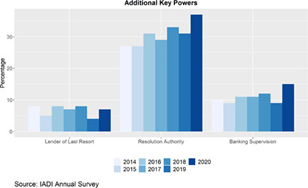 SBV Deputy Governor Pham Thanh Ha: In the first months of 2023, many countries continue to face the risk of economic recession and high inflation. Inflation is high, so the trend of monetary tightening is inevitable. Specifically, the Fed raised interest rates with the fastest frequency and speed in history, 10 times in a row, increasing 5% within 14 months; the decline in global trade, the crisis at some banks in the US and Europe continues to pose challenges for monetary policy management around the world.
SBV Deputy Governor Pham Thanh Ha: In the first months of 2023, many countries continue to face the risk of economic recession and high inflation. Inflation is high, so the trend of monetary tightening is inevitable. Specifically, the Fed raised interest rates with the fastest frequency and speed in history, 10 times in a row, increasing 5% within 14 months; the decline in global trade, the crisis at some banks in the US and Europe continues to pose challenges for monetary policy management around the world.
Domestically, the economy also faces many difficulties. Businesses withdrawing from the market are increasing. According to data for the first four months of 2023, the number of enterprises withdrawing from the market was 77,000, up 25.1% over the same period last year. Business conditions continued to narrow as the Purchasing Managers' Index (PMI) of Vietnam's manufacturing industry dropped again from 47.7 in March to 46.7 in April, marking the fifth month below the 50 mark in the last six months.
In the context of a complicated and unpredictable international environment, as a small economy with a very large openness like Vietnam, there are still many internal difficulties, posing many challenges in the management of monetary policy. But under the close direction of the Government and the Prime Minister, the banking industry has been proactive, flexible, and quickly adapted to the situation in monetary policy management and banking activities.
Specifically, the SBV flexibly operated open market operations to stabilize the money market. Accordingly, the SBV maintains offers to buy valuable papers with volumes and terms suitable for the objectives of monetary policy management, ensuring liquidity for credit institutions, and stabilizing the money market. Along with that, the SBV has 3 times reduced the operating interest rate to remove difficulties for the economy, businesses and people.
On the basis of the economic growth target of about 6.5% in 2023 and about 4.5% inflation set by the National Assembly and the Government, the SBV orients the credit growth in 2023 to about 14-15%, with the adjustment in accordance with actual developments and situations, contributing to stabilizing the macro-economy, and supporting reasonable economic growth. Accordingly, the SBV controls the growth of credit volume and structure reasonably, meeting the credit capital needs of the economy in order to contribute to controlling inflation and supporting economic growth; direct credit institutions to increase credit throughout the year at a reasonable rate, directing credit to production and business fields, priority fields and economic growth drivers according to the Government's guidelines; ensure safe and effective credit activities, create favorable conditions for businesses and people to access bank credit capital.
Reporter: Since the beginning of the year, the SBV has three times reduced the operating interest rate, while central banks around the world, especially the FED, have not yet announced a roadmap to stop raising interest rates. Can the Deputy Governor explain why the SBV has taken steps to adjust this policy?
SBV Deputy Governor Pham Thanh Ha: In the first months of 2023, central banks around the world continued to raise interest rates and anchor them at a high level. Inflation was still unpredictable. Domestically, although inflation has increased, it tends to slow down, economic growth still faces many difficulties; excess liquidity of credit institutions, meeting the payment needs of the economy; the exchange rate fluctuated stably, the SBV was able to purchase foreign currencies to supplement the State's foreign exchange reserves. At the same time, credit institutions have also made efforts to reduce costs and reduce deposit interest rates.
In order to continue implementing the policy of the National Assembly and the direction of the Government and the Prime Minister on reducing lending interest rates in order to remove difficulties for the economy, businesses and people, the SBV has continuously adjusted 3 times the interest rates with a reduction of 0.5-1.5%/year in March, April and May 2023. Specifically: 1.0% per year reduction in refinancing and discount rates, 1.5% per year reduction in overnight lending rates in inter-bank electronic payments and loans to cover capital shortfalls in clearing payments by the SBV of credit institutions and foreign bank branches; 0.5-1.0% per year reduction with the maximum interest rate on deposits in VND with a term of less than 6 months; 1.0% per year reduction with the maximum short-term lending interest rate in VND of credit institutions for borrowers to meet capital needs for a number of economic sectors and fields.
The continuous adjustment of the operating interest rates is a flexible solution that is suitable to the current market conditions to support the process of economic growth recovery in accordance with the guidelines of the National Assembly and the Government, thereby continuing to reduce the market's lending interest rates, increasing the accessibility of capital for businesses and people, contributing to economic growth. At the same time, the SBV is also one of the first central banks in the world to reduce the operating interest rate in the first months of 2023 to support economic recovery and development.
In addition, the SBV has implemented many synchronous measures to strive to reduce lending interest rates to remove difficulties for businesses and people in accordance with the direction of the National Assembly and the Government in Resolution No.43 and Resolution No.11 such as encouraging credit institutions to reduce costs to stabilize lending interest rates to support enterprises to recover and develop production and business. The SBV has worked with commercial banks to propose further reducing interest rates to support businesses and the economy to recover production and business in February and May. Accordingly, credit institutions have been taking measures to reduce lending interest rates to support businesses, people and the economy to recover production and business.
Based on the management and direction of the SBV, up to now, the interest rate level has been basically stable, new interest rates tend to decrease gradually in the first month of 2023. The average deposit interest rate of commercial banks is at about 6.1% per year (down 0.37% per year compared to the end of 2022); the average new lending interest rate in VND of commercial banks is about 9.07% per year (down 0.9% per year compared to the end of 2022).
In the coming time, the SBV will continue to closely monitor domestic and international monetary developments, forecast inflation and market interest rates to adjust interest rates in line with the macro balance, inflation and monetary policy objectives. The SBV will continue to take measures to encourage credit institutions to reduce costs to reduce lending interest rates to support businesses to recover and develop production and business.
Reporter: The economy is facing the risk of decline, weak capital absorption... according to experts, to ensure multi-objectives and support GDP to grow at 6.5% and control inflation around 4.5%, ensure system safety... creates a huge challenge for the executive agency, especially in the context that monetary policy space is quite limited. There are suggestions that the management agency needs to change the state from being tight and cautious to easing cautiously, supporting growth to ensure the achievement of the multi-target policy. What is the opinion of the SBV on this issue, Mr. Deputy Governor?
SBV Deputy Governor Pham Thanh Ha: As shared above, in the context of the complicated and unpredictable international environment, being a small economy with a huge openness like Vietnam, there are many internal difficulties and challenges for the management of monetary policy. Especially, the tools to manage interest rates, exchange rates and credit face many challenges, so that they can harmonize many conflicting goals such as both supporting the economic recovery after the pandemic and ensuring control of the inflation in the context of high and persistent global prices and inflation despite the drastic fight against inflation by countries; while ensuring the value of Vietnam dong in the context of complicated fluctuations of many currencies in the world while still having to reduce interest rates; while ensuring the safety of the banking system while still ensuring the credit needs of the economy, continuing to support solutions to remove difficulties for borrowers...
Difficulties of the economy are overall difficulties, which can be divided into difficulties of enterprises and difficulties of banks. If banks support businesses at an acceptable level, the economy will get better. If the bank postpones, delays, or loosens credit conditions, the difficulties will shift to the bank, posing a risk of systemic insecurity. The difficult problem here is that the SBV has to find a harmonious point that still supports the economy but still ensures the safety of the banking system. In particular, in operating monetary policy, "trial and error" is not allowed. Therefore, in operating monetary policy, it is necessary to balance the goals of stabilizing the macro economy, controlling inflation, stabilizing the money market, and aiming at the common long-term goal of stabilizing the banking system.
Reporter: Please tell us the direction of policy management from now until the end of 2023 to ensure that monetary policy remains firm against possible "headwinds", thereby supporting economic growth and macroeconomic stability?
SBV Deputy Governor Pham Thanh Ha: The remaining months of 2023 are forecasted to continue to face many challenges with monetary policy management due to complicated developments in both the world and domestic economy. The world economy is expected to slow down with many uncertainties, although inflation has shown signs of passing the peak, it will continue to remain at a high level in many countries, many central banks still maintain high interest rates, high commodity prices. The world's transformation has many potential risks of drastic changes. Meanwhile, the domestic economic growth is also facing increasing risks when the world demand declines negatively affecting the manufacturing and processing industries, inflation pressure remains, the investment and consumption activities also face many difficulties. Accordingly, the SBV continues to closely monitor economic and monetary developments at home and abroad, firmly, proactively and flexibly administer monetary policy tools to contribute to controlling inflation and supporting economic growth, stabilizing the currency and foreign exchange markets. Specifically:
Firstly, operate open market operations flexibly, proactively, ready to support liquidity for the credit institution system. Refinance credit institutions to support liquidity, lend to programs approved by the Government and Prime Minister, support the process of restructuring credit institutions and dealing with bad debts; Operate the compulsory reserve instrument in line with economic and monetary developments and other monetary policy management measures to achieve monetary policy objectives.
Secondly, operate interest rates in line with macro balance, inflation and monetary policy objectives; continue to encourage credit institutions to reduce costs and lower lending interest rates in order to support enterprises to recover and develop production and business.
Thirdly, manage the exchange rate in line with market conditions, intervene in the market when necessary, coordinate and synchronize monetary policy measures and tools to stabilize the foreign currency market, contributing to controlling inflation. development and macroeconomic stability.
Fourthly, continue to manage credit growth in line with the oriented target of 14-15% for the whole year 2023; direct credit institutions to move credit into production and business fields, priority areas and economic growth drivers according to the Government's policy, strictly control credit in potential risky areas; create favorable conditions for businesses and people to access bank credit capital.
Reporter: Thank you very much, Deputy Governor!



























